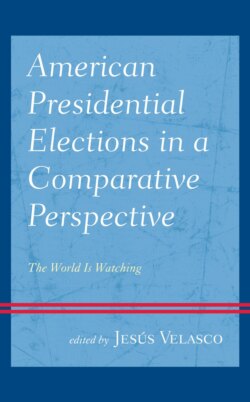Читать книгу American Presidential Elections in a Comparative Perspective - Группа авторов - Страница 28
На сайте Литреса книга снята с продажи.
FROM CHINA-BASHING TO AMERICA-BASHING: THE ELECTION AND ITS UNINTENDED IMPLICATIONS
ОглавлениеDue to the enormous significance of China-US relations, so-called China issues are popular talking points during US presidential elections. Although issues related to China have rarely dominated elections in the United States, China-bashing on the campaign trail does add to the turbulence of the bilateral relationship. Thus, the Chinese media and experts are used to devoting most of their attention to following the candidates’ China rhetoric on the campaign trail. Unsurprisingly, the 2016 presidential election saw no small amount of China-bashing from both parties’ candidates, which raised Chinese concern.
It is worth noting that the manipulation of China issues in this year’s election has been somewhat different from past elections, not only in terms of the specific issues that were brought up, but also because there seems to be more frequent and negative coverage of the China issues during the campaign. For example, Hillary Clinton had on many occasions challenged China’s qualifications as a “market economy,” while claiming on her campaign website that China has used “unfair trade practices to tilt the playing field against American workers and businesses.”44 Donald Trump had also vowed repeatedly that once elected, he would take American jobs back from China, declare China a “currency manipulator,” take punitive measures against China to end its “intellectual property violations,” and levy heavy taxes on China in order to counterbalance China’s “illegal export subsidies” and other “unfair advantages.” As far as Chinese scholars are concerned, these issues are the externalization of domestic issues that relate primarily to the United States’ economy and labor market. Because of the perceived advantages China is gaining over America, both in economy and influence, the presidential candidates have increasingly used China as a “scapegoat” in an attempt to address the American public’s frustration over the American economy’s weak performance as well as other domestic problems.45
Despite the candidates’ intensive criticism of China, however, Chinese policy experts generally agree that campaign rhetoric is not the most reliable guide to the future policy of the next administration. Indeed, trends emerged in the 2016 presidential election that displaced China bashing as a significant cause of Chinese attention. As it turned out, the general narrative of the 2016 election in China was taken over by a different kind of critique—America-bashing if you will—as the faltering of American democracy and the ugliness of the election became the central targets of criticisms and condemnation from the Chinese media and pundits. There is no doubt that the unprecedented America-bashing in the 2016 election changed Chinese perceptions of the United States significantly, but to understand its full implications, it is useful to briefly take stock of Chinese perceptions of the United States from a historical perspective.
